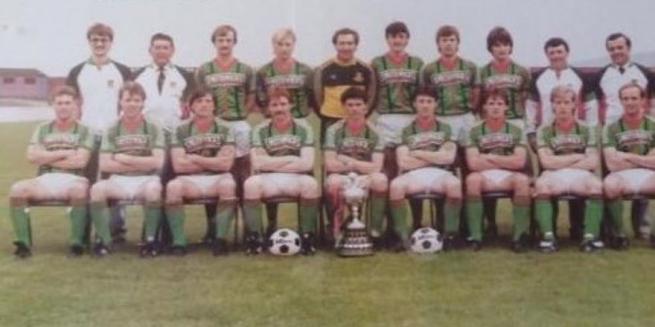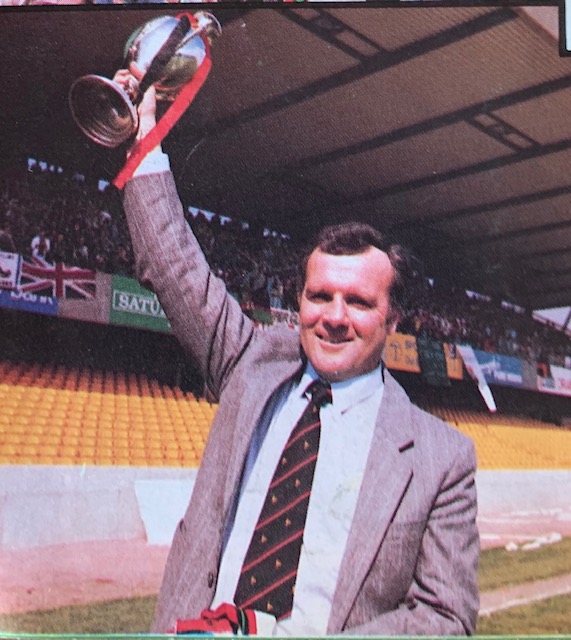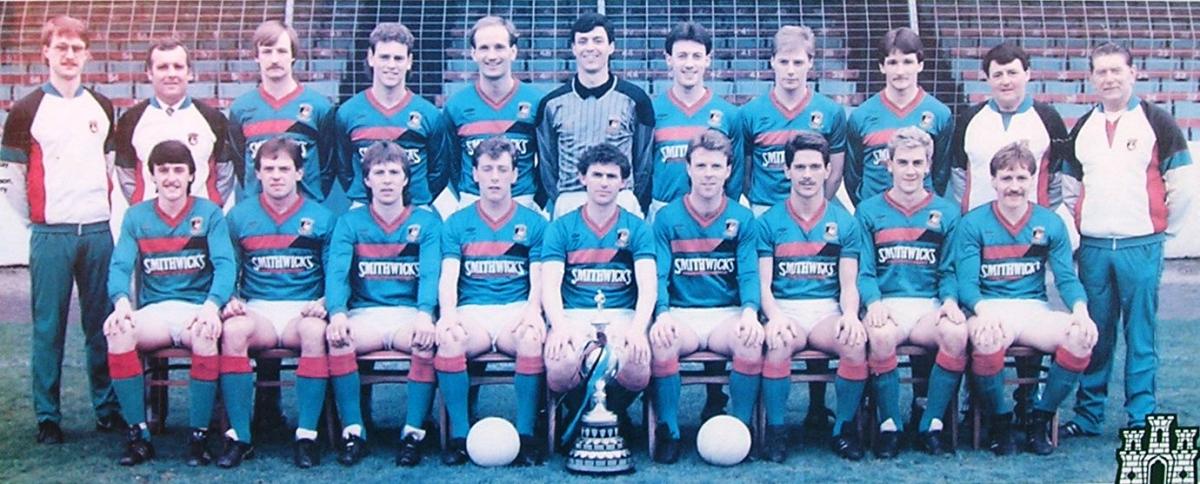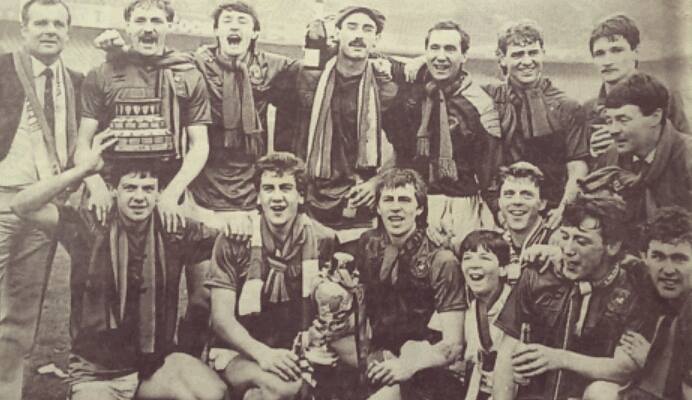
For the second in this series on our league or cup winning managers of the past four decades, we concentrate on Billy Johnston’s spell, This tenure is often ignored by historians as it came between the much more high profile Ronnie McFall and Tommy Jackson. But it was a period in which we won the first two of our four successive Irish Cups in the eighties. Billy Johnston has been out of football since leaving the Oval in 1987, so for this edition, Ian Clarke spoke to Jim Cleary, captain during the Johnston era, for some of his insider’s thoughts on the period.
BILLY JOHNSTON (1985-1987)

1984-85: When Ronnie McFall euphemistically “had his contract terminated” on Boxing Day 1984, the club declared that it was because “one league title and one Irish Cup in five and a half seasons is not good enough” for a club with the expectations of Glentoran. It was a very different situation from when Ronnie was appointed six years earlier. This time there was little speculation about who would succeed him. Frankly, there were no outstanding candidates. Former Glens player Roy Coyle was firmly ensconced at a dominant Linfield and the stock of the others who had been in the frame in 1979 had fallen since then.
So, club legends Bimbo Weatherup and Billy McCullough were entrusted with the joint caretaker role while the club looked for someone more permanent. This actually went very well with a six-game undefeated run, five wins and a draw, including big league wins over Glenavon and Larne and a home win over league leaders, a very strong Coleraine.
Finally, a couple of days after a 6-0 win over Larne, Billy Johnston was announced as manager on February 13th. Ironically, he had been linked with the job when McFall was appointed. At that stage he was Ballymena United but by the time he joined Glentoran, he had been out of football for a couple of years after leaving Bangor. He had a great CV, a Northern Ireland full international player who had won two league titles with Crusaders and taken Ballymena to the Irish Cup Final. So, while he was a surprise appointment, he was one who could stand over his record.
Jim Cleary said of Johnston’s appointment: “I was delighted Billy got the job. I already knew him pretty well as he worked with my wife at BIFHE. He’d a great playing background and had done very well as a manager before he joined us. Not long before Ronnie went, he’d brought Billy Caskey and Terry Moore back from the States, so I thought we were still ready to go.”
So, what did Billy Johnston inherit? The team was third in the table and still in the Irish Cup. In his first match, a 2-2 away draw at B-Division Ballyclare Comrades in the Irish Cup, was Paterson. Neill, Stewart, Morrison, Moore, Cleary, Mullan, Bowers, Blackledge, McDaid, Caskey, with Johnny Jameson, Ron Manley, Tom Connell, Tommy Leeman and Reggie Hillen all in the squad. So clearly it wasn’t a rebuilding job we needed, with all of those players apparently in or still to reach their prime.
After stumbling to a draw with Ballyclare he got off to a decent start, winning the replay 3-1 through a Gary Blackledge hat trick. Apart from a defeat against Linfield at Windsor, made inevitable by a very early red card for Blackledge after a ridiculous dive by Lee Doherty, league form was fine, and we cruised relatively easily into the semi final of the Irish Cup.
That semi final saw the maturing of a Glentoran legend. Played off the pitch for 85 minutes and a goal down to a very strong Coleraine team, midfielder Raymond Morrison struck twice in the closing minutes to give us a 2-1 win. Up to that point “Nuts” Morrison had spent three seasons as a popular but unspectacular winger cum midfielder, But that day he did for the first time what we came to expect in big game after big game for the next nine years, stepping up to the plate to score big goals when the Glens most needed it. It also completely changed the course of what had up to then ben a very uninspiring season.
We played in two finals in May 1985. The first was the Irish Cup Final v Linfield at the Oval. The outcome was similar to the first game in 1983 with a Gerry Mullan opener cancelled out for a 1-1 finish. A week later Billy Johnston won his first trophy with Glentoran with the famous Paul; Mooney own goal and Jim Cleary had the pleasure of receiving the trophy at the home of our biggest rivals. Six days later the County Antrim Shield was Johnston’s second trophy with a first Glentoran goal for Davy Mills and a penalty from Alfie Stewart (ironically two lads from that team who would go on to great success under Ronnie McFall) securing a 2-1 win over Crusader at the Oval.
So, a good start from Johnson. Two trophies in the last week of the season and, although we finished third in the league – five points behind Linfield and two behind Coleraine after drawing two of our last four games – there was plenty of room for optimism,
1984-85 Irish Cup Winners
1985-86: Glentoran had an uncharacteristically quiet summer with only left sided player Jim Cowden (distillery) coming in as a high profile signing along with Brian Strain from Amateur League Killyleagh. Leaving the club that summer were the ill-fated Harry McCue who headed back south, the retirement of Robert Strain, and the departures of Davy Neill for Distillery and John McDaid for Portadown. The latter was a tragedy as McDaid had never fully re -established himself after a career threatening injury against Linfield three years earlier. Also leaving was a certain Stephen Baxter for Ards, having never made a first team appearance. But most telling was the departure of the truly irreplaceable Billy Caskey back to Tulsa Roughnecks after just a half season back in Parkgate Avenue. But we hadn’t seen the last of him.
It was an uninspiring start to the season, knocked out of the Ulster Cup by Cliftonville (at home), The County Antrim Shield by Dundela (at home) and the Gold Cup by Crusaders (at home!). So, by the time the league started we were out of three of the five trophies so there was no great sense of optimism as we went after our first league title in five years.
But we had a decent start with a six-game winning run, despite losing Barney Bowers to a broken leg v Carrick on Boxing Day. So, we entered 1986 top of the table. Our League performances were pretty good, but two of the three defeats in the first half of the campaign were to Linfield so at the half way point we were seven points off, in second place.
However as the Irish Cup got into gear our league form took a monumental dive as we took just nine points from twenty seven and winning just two of our last nine league matched to finish a dismal fourth, twelve points behind Linfield and also lagging behind Coleraine and Ards. This wasn’t what we had come to expect, as under Ronnie McFall we had experienced a series of glorious disappointments a=in the league, scaling great heights and stumbling at the wrong time. This season was just one long endurance test for supporters who couldn’t understand how this exceptional squad could perform so consistently poorly in the second half of the campaign,
Not for the only time, the Irish Cup was to be our saviour and the big story was a 19 year old left sided striker who didn’t get his first game of the season until he came on as a late sub for Gary Blackledge against Portadown in December. He scored his first senior goal against Newry a week later, a couple against Carrick on Boxing Day and stayed in the squad for the rest of the season. PAUL Millar was the story of the Irish Cup that season, scoring in every round – against Distillery (2), Ballyclare, Cliftonville and Brantwood – as we reached our second successive final.
Despite starting in most of our previous matches, Millar was substitute (only one sub in those days) with Johnston going for the much more experienced – and very reliable – Manley, Mullan and Jameson with Gary Blackledge completely out of favour. The Glens starting in that cup final didn’t have a single player who didn’t have at least one winners medal, but we didn’t start as favourites against a good Coleraine team that had finished two places ahead of us in the league.
For the third successive occasion Gerry Mullan put us ahead in the first half at Windsor, cancelled out early in the second half by a penalty from Felix Healy. It was fizzling out for what would be a third successive final replay for us, when deep into injury time, Millar (a late sub for Johnny Jameson) cut in from the left and hit a long range shot past Jim Platt in the Coleraine net. Millar was later named “Ulster Young Player of the Year” after the final, the second year in a row it came to the Oval after Alfie Stewart won it in 1985.
There were a couple of meaningless league matches still to play and these were used to give debuts to Andy Mathieson, Robert Craig, and Philip Major, three local lads and graduates from the Colts and Seconds. With Stewart, Millar, Strain, Connell, Mills and Major all in place, Ronnie McFall’s great Portadown team was starting to take shape!
Jim Cleary said of that season: “We couldn’t really understand why it had gone so wrong in the league that season. We had a good squad plus young players like Brian Strain and Windy, yet we definitely lacked the resilience to pull out some of the results we needed in what should have been some of our easier games. Casko was obviously a terrible loss as he was so important to the team, but Windy came in and did really well. We all knew about him from the seconds and friendlies, so he was always going to be a good player. He was very left sided and the way he could cut in and shoot gave us a different option to what we were used to. We didn’t have him for long, but he gave us a lot that season.”

1985-86 Irish Cup Winners
1986-87: Despite the Cup win, there was definitely a mood of discontent around the Oval after our dismal league showing and early exits from the other cups. Leaving at the end of the 85/86 season were Tommy Leeman (emigrated), Paul Dixon (Derry City), Reggie Hillen (Carrick Rangers) and David Mills (back to Amateur League football before successfully re-emerging at Portadown.
So, it was important the manager pulled off a few tricks in the summer. He did, as Ulster Player of the Year Pat McCoy, and goalkeeper Dean Smyth arrived from Crusaders. The supporters were elated at the second and final return from Tulsa of Billy Caskey. But one signing by Billy Johnston that summer was to make a massive contribution to the club’s history. That was the arrival of Gary Macartney from the RUC. Everyone knew about the lad with the fantastic scoring record in the B Division, but no one had seen him. Also, how many players with big reputations had made the step up and immediately flopped? Plenty. So, the jury was out, But not for very long.
Jim Cleary: “Macart was an incredible signing and a great player for us. He was 26 or so when he stepped up, but he never looked out of place at our level. We’d had great strikers already with Ron, Gerry and Blackie so it was a long shot bringing anyone up from the B Division. But Macart settled in right away and Billy then Tommy always had him as their first choice.”
The season was rearranged that season with the league starting in August and due to finish in February. We got off to a decent start with an eight-game unbeaten run before a 3-1 away defeat at Seaview. We bounced back from that with another three wins, including two “Big Two” wins, home and away, over the course of six days to have the Glens top at the half way point. During that spell we also won the County Antrim Shield , easily seeing Glenavon off 3-0 in the final (Macartney, Millar, Cleary) and had two vert strong showings against Lokomotiv Leipzig in the Cup Winners’ Cup,, including a good 1-1 draw at home. So, going into December everything looked in pretty good shape.
Not for the only time, December was the month that saw the start of a Glentoran decline with just seven points taken from fifteen. December also saw the return to the Oval of Alan Harrison after three and a half seasons away, Harrison joined from Derry City where he’d been selected that season for the Irish Olympic football team. Great things were expected of this outstanding local centre back.
On New Year’s Day the wheels truly came off with a catastrophic 4-0 away defeat against Larne. The following week a 2-0 loss at Ballymena saw the resignation of Bimbo Weatherup as First Team Coach. Replaced by equally legendary former captain Billy McCullough. But the ship was getting shaky.
Billy Johnston stayed for one more game but resigned after a 3-2 home defeat against Ards, our third defeat in a row. Th team for this final game was: Smyth, Stewart, Keery, Connell, Moore, Cleary, Craig, Caskey Macartney, Blackledge McCoy with Jameson as sub. The last two goals of the Johnston era came from the two Garys - Macartney and Blackledge.
By this stage there was also a serious question mark over Alan Harrison’s registration, an issue that would ultimately see the Glens docked eight league points and the resignation of the club secretary.
Jim Cleary: “I enjoyed working with Billy. He was a good guy and a good communicator. There was an expectation at Glentoran that we would play football of a certain style. Billy tried to maintain that, but it didn’t always work for us or him in the league. Still we did play good football under Billy, he won three trophies in his time with us and he brought players like Macart and Brian Strain (though he wasn’t used nearly enough when he was with us and was a terrible loss given the career he had at Portadown) to Glentoran and he developed Windy as well. And he brought Casko back. So, I’ve plenty of good memories of my time with Billy.”

The 1986 Irish Cup winners celebrate




